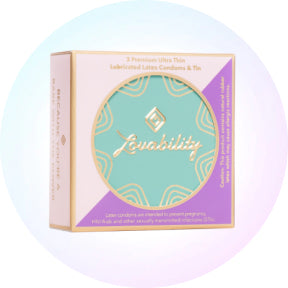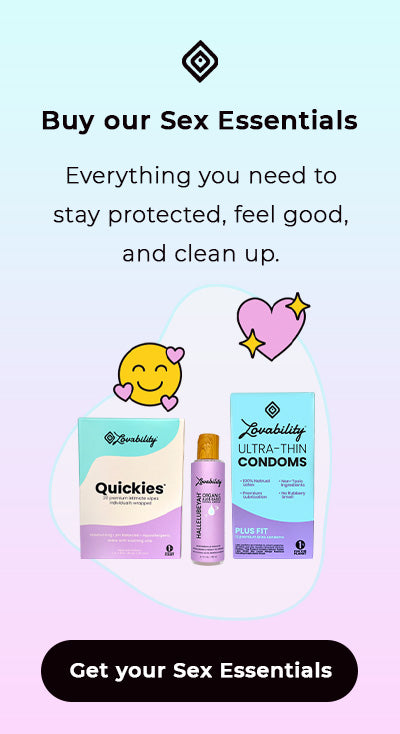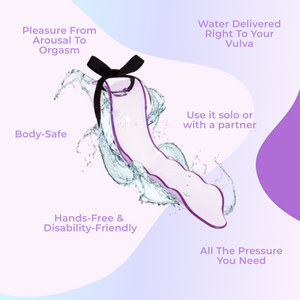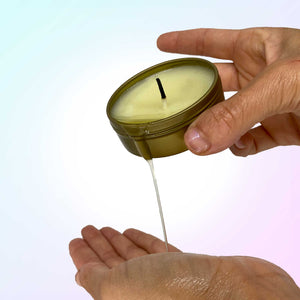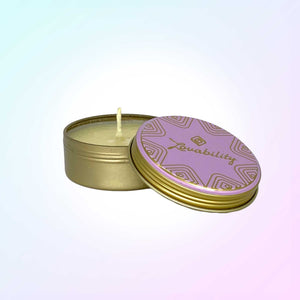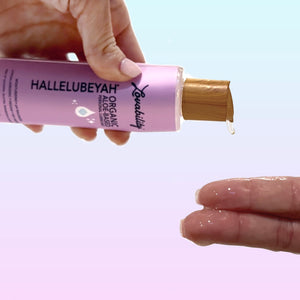Hey! It’s Liza and Maud here to get down to business and talk about orgasms. Like, why is it that the male orgasm is THE measure of success in a heterosexual encounter? WTF is up with that?!
I (Maud) would love to say that my relationship with orgasms has been all fun and games, but realistically it hasn’t. For the longest time I have heard my friends value whether sex is good or not based solely on whether their male counterpart came.
Countless de-briefs with my friends after a hook up have gone something like this:
“Yeah the sex was really good! I didn’t cum or anything, but he did!”
OR
“You know, the sex was alright. I mean it felt good and I think he was enjoying it, but it was late and we were sort of drunk and he couldn’t finish.”
Pause. Hold on. Back up.
Those two scenarios may seem different, but they are very similar; they both prioritize the male orgasm. On top of that, the second is littered with excuses– not excuses as to why the woman couldn’t cum, but why the man couldn’t. We both have had our self-esteem fall victim to the success or failure of the male orgasm; the more we talked and did some research, the more we realized these feelings are more common than our own past experiences.
Why Do We Prioritize A Man's Orgasm?
We would love to say our threshold for good sex has always been when both the man and woman cum, right? The answer: a big, fat nope.
If we look at society through a heterosexual lens, the male orgasm is the trophy that determines successful sex. This not only completely ostracizes anyone who does not identify as straight, but it is also detrimental to how women value themselves within heterosexual relationships.
I (Liza) have felt disappointment and even embarrassment when I have been “unsuccessful” in bringing my partner to orgasm, and then for the longest time, I never reached climax because I was too embarrassed to ask for what I wanted. I spent all of my time thinking about how to please my partner and spent none of it thinking about my own pleasure or even being deserving of pleasure.
Sex Should Be Pleasurable For All
Sex is supposed to be pleasurable and fun for everyone involved. When only one partner reaches orgasm and the other is neither taught to ask for pleasure nor told that they are deserving of pleasure, it is a BIG problem.
When I got to college and went through my party hook-ups and one-night stand phase, I would leave with someone, have unsatisfying and meaningless sex, and then immediately rush home to masturbate. What started as a routine quickly became something of a self-fulfilling prophecy. I went into every encounter knowing I wasn’t going to orgasm from sex alone which made me adopt a sort of defeatist attitude about my own pleasure.
How Men And Women Think Differently About Pleasure
Yes, there are guys out there who actually do care about their partner’s pleasure (generous and considerate dudes are the GOAT; if you haven’t been with a giver with skills, you are really missing out). Unfortunately, most guys either don’t care about equality in the bedroom or were simply never taught to invest in their partner’s pleasure.
Women, on the other hand, are rarely taught to prioritize their own pleasure. Most sex education focuses on the active role of sex (i.e., the act of penetration); that is not just limiting for women, it is a narrow scope of sexuality as well.
And that difference, right there, is where the problem lies.
The Orgasm Gap
Ever hear of the orgasm gap – the phenomenon in which women report fewer orgasms than men? Statistically, in cisgender relationships, women on average reported having one orgasm for every three of their male partners. The orgasm gap is real and can be incredibly damaging to women’s perceptions of sex and their sexuality.
The Myth of The Finicky Female Orgasm
The orgasm gap perpetuates the assumption that women have a more difficult time cumming (not true), so it’s not deserving of the effort (sorry guys, that’s just lazy). Myth has it that the female orgasm is “finicky” and the male orgasm is “too eager” – seriously? Think back to your sex education classes!
It’s Liza here, and I for one was never taught jack sh*t about the vagina or my right to pleasure. I didn’t even know I could orgasm until my male friend told me in our sophomore year of high school, and he only knew by watching porn (which was more acceptable for guys to admit than girls – still kinda is that way). In reality, both men and women can experience pleasure, and they should! This is what we should be teaching people.
Men aren’t societally trained to view sex in the same way. Consider how many times you’ve had this brief, offhanded conversation after the act is done:
Him (finished): “You came, right?”
Me (just getting started): “Well…uh….No.”
It’s easier to say “yes,” for fear of hurting their egos and scurry home to make yourself really feel good. But that’s not taking charge of your sexual well-being and meeting your needs.
When A Guy Prioritizes Her Pleasure
Happy to report that this is not the universal truth and that there are indeed exceptions. One winter night during my first year of college, I had a one-night stand with a mutual friend. In the process of hooking up, he actually called me out on faking my orgasm and insisted that he continue trying until he was able to bring me to climax. It was the first time a guy a) actually called my bluff and, b) WANTED to put effort into making me orgasm.
Women Need To Ask For Their Own Pleasure
But the onus can’t just fall on men. Ladies, it’s time we learn how to actually ask for our own pleasure and meet our needs. Keep in mind that on average it takes a vulva approximately 20 minutes to become fully aroused. So take your pleasurable time and enjoy the journey. And remember, women come first (wink wink)!
Women are often less encouraged, and therefore much less likely, to ask for what they want in a sexual encounter. Many women feel shame or embarrassment when even thinking about asking their partner for sexual gratification. Part of this comes from society’s gendered views on expressions of sexuality and gender norms; men are the “active” (aka the penetrator) and, therefore, sexually adventurous/dominant, while women are the “passive,” aka the receiver (the word vagina actually means “sheath” in Latin). For women, this means that any outward expression of their sexuality is considered deviant behavior — in other words, “slutty”.
Societal Gender Constructions Around Sexuality
Even though as a society we’ve finally come to tolerate premarital sex and are somewhat “progressive” on hook-up culture in general, we can’t ignore how deeply entrenched gendered constructions of what sexuality should look like continue to imprison us. So when women find themselves in circumstances in which their partners are (for whatever reason) unable to orgasm, they are much more likely to see the sexual experience as “unsuccessful”, or, even worse, tie their self-worth to their ability to bring a partner to orgasm. The orgasm gap entraps us all, and it can cause real damage to women’s self-esteem.
Let's Flip The Script
Queens, femmes, vulva-owners: we’re here to help you get over all those doubts, shames, and insecurities (the pesky ones that swim around in your head while you’re getting it on with your partner) that tell you it’s OK your partner doesn’t care about your orgasm or that it’s wrong/embarrassing to ask for what you want. We’ve certainly been there and we know how you feel, but you don’t have to feel that way. It took us both a hot minute to get here but we’ve left our days of non-vocalization and unsatisfying sex in the past. We can tell you for a FACT that the grass is greener on the other side.
6 Tips To Help You Get Your Share Of Orgasms
Here are some thoughts to keep in mind as you learn how to vocalize your wishes and desires with your sexual partners:
1. Communicate
Your partner is not a mind reader, nor is it likely that they are a “vagenius” (a vagina genius, for those of you that didn’t see the best episode ever of New Girl). If you don’t ask them or at least tell them what you like in bed, it’s probably a one-in-a-million chance that they figure it out on their own.
2. Practice Speaking Up
Practice vocalizing by partnering up with a friend or a lover to give and receive a hand or foot massage. You should find that some strokes or pressure points may cause pain while others feel so good they leave you wanting more, but it should become abundantly obvious that to get what you want, you have to vocalize.
3. Focus On Pleasure, Not Just Achieving An Orgasm
Sex doesn’t have to be nor should it be solely about completion; it should be about giving and receiving pleasure with the partner(s) of your choice. Why on earth should you want to focus on the end when everything leading up to it feels so good?
4. Introduce Sex Toys
Speaking of pleasure, TOYS ARE YOUR FRIENDS. There are SO many types of vibrators out there— go nuts! Some have even referred to the vibrator as “The Great Equalizer” when it comes to the orgasm gap. Might make you orgasm more easily – or give you the boost of confidence to do so; in any case, it will sure feel f*cking fantastic.
5. Arousal & Edging For More Powerful Orgasms
Yes, eventually it’s nice to reach orgasm, but I have to say, it can be even hotter getting teased. Sometimes my partner will repeatedly bring me to the brink of climax only to stop and leave me hanging for minutes or even hours, and when I finally do orgasm it results in a bigger and much longer climax.
6. Great Sex Can Happen With Or Without Orgasm!
This may come as a shock to you, but great sex doesn't require an orgasm! This may be easier to grasp in a long-term relationship because you are having sex with the same person over and over again (which comes with certain advantages like taking your time, teasing, on-going communication, or taking time-outs) versus in a one-night stand where lust and satiation are on the mind, but that doesn’t make it any less true.
Whether you’re in a long-term relationship or you’re casually hooking up, spending too much time focusing on whether or not you’ll “succeed” in bringing your partner to orgasm more often than not means that you’re spending too little time focusing on or asking for your own pleasure, and if the sex isn’t pleasurable, or at the very least enjoyable, then what’s the point?
Above all else, remember this: orgasms are not and should not be the measure by which you define a successful sexual experience.
ABOUT THE AUTHORS
A senior double Anthropology and Women’s & Gender Studies Major at Kenyon College in Ohio, Liza Brilliant (@brill.ant on Insta) is devoted to destigmatizing conversations around sexuality and promoting healthy, sex-positive femininity. Liza hopes to one day work in law and public policy, specifically around destigmatizing and decriminalizing sex work. She firmly believes that sex-positivity has the power to influence broader political and social norms, changing the world one orgasm at a time.
A senior in William & Mary and St Andrews’ joint degree program for English has always been passionate about initiating conversations around sexual destigmatization and female sex-positivity. Maud Purinton (@maudpurinton on Instagram) is an avid skier and mixed media artist and looks forward to pursuing a career in fashion and beauty PR after she graduates.
More Articles You Might Love
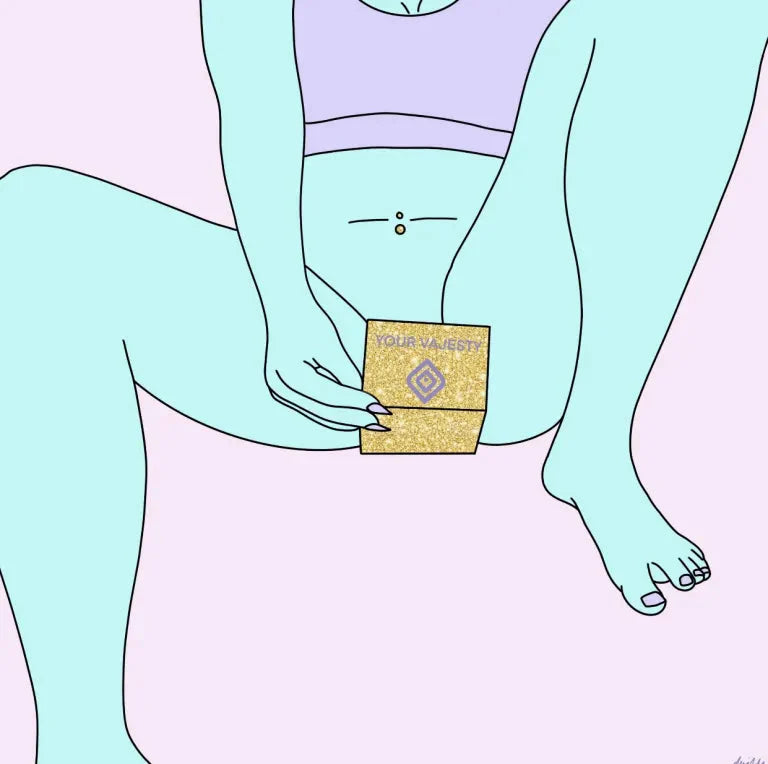
Get To Know Your Vulva



